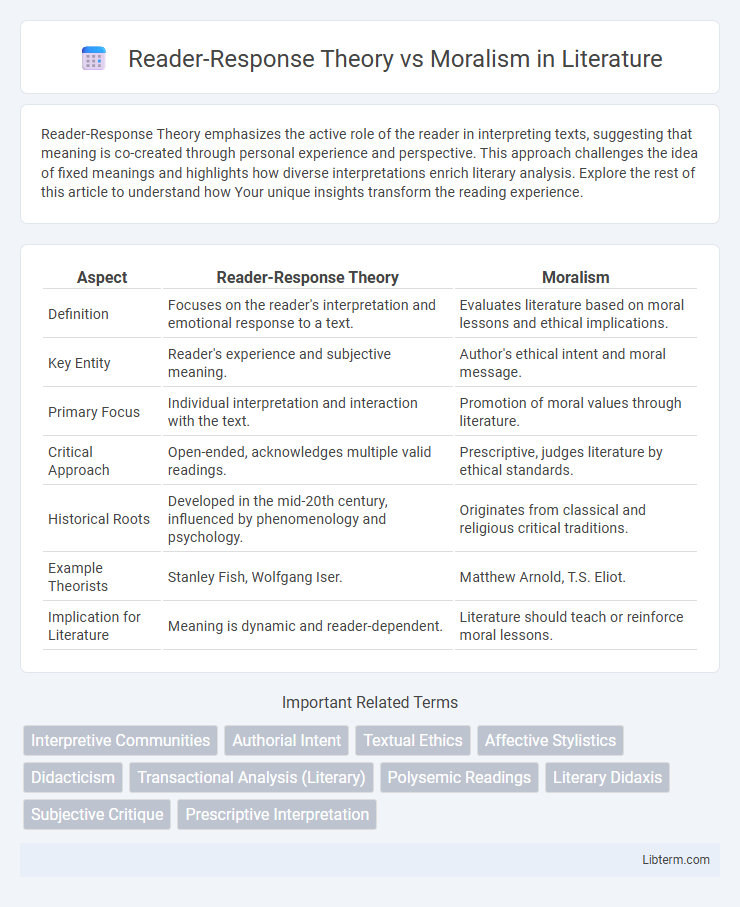Reader-Response Theory emphasizes the active role of the reader in interpreting texts, suggesting that meaning is co-created through personal experience and perspective. This approach challenges the idea of fixed meanings and highlights how diverse interpretations enrich literary analysis. Explore the rest of this article to understand how Your unique insights transform the reading experience.
Table of Comparison
| Aspect | Reader-Response Theory | Moralism |
|---|---|---|
| Definition | Focuses on the reader's interpretation and emotional response to a text. | Evaluates literature based on moral lessons and ethical implications. |
| Key Entity | Reader's experience and subjective meaning. | Author's ethical intent and moral message. |
| Primary Focus | Individual interpretation and interaction with the text. | Promotion of moral values through literature. |
| Critical Approach | Open-ended, acknowledges multiple valid readings. | Prescriptive, judges literature by ethical standards. |
| Historical Roots | Developed in the mid-20th century, influenced by phenomenology and psychology. | Originates from classical and religious critical traditions. |
| Example Theorists | Stanley Fish, Wolfgang Iser. | Matthew Arnold, T.S. Eliot. |
| Implication for Literature | Meaning is dynamic and reader-dependent. | Literature should teach or reinforce moral lessons. |
Introduction to Reader-Response Theory and Moralism
Reader-Response Theory centers on the reader's interpretation as the fundamental element in understanding a text, emphasizing individual emotional and cognitive responses that shape meaning. Moralism evaluates literature based on ethical content and the promotion of moral values, prioritizing the author's intended moral lessons over subjective interpretations. These contrasting approaches highlight the tension between personal engagement with a text and adherence to universal moral standards in literary criticism.
Defining Reader-Response Theory
Reader-Response Theory centers on the reader's interpretation as the primary source of meaning in a text, emphasizing the active role of individual perception and emotional response. It contrasts sharply with Moralism, which judges literature based on ethical or moral standards intrinsic to the work itself. Key theorists like Stanley Fish and Wolfgang Iser highlight that meaning emerges through the dynamic interaction between reader and text rather than fixed authorial intent or moral lessons.
Key Principles of Moralism in Literary Criticism
Moralism in literary criticism asserts that a text's value hinges on its ethical content and the moral lessons it imparts to readers. It emphasizes the importance of evaluating literature based on its ability to promote virtuous behavior, social justice, and moral clarity. Unlike Reader-Response Theory, which centers on individual interpretation, Moralism prioritizes an objective moral framework as the primary criterion for judgment.
Historical Background of Both Approaches
Reader-Response Theory emerged in the mid-20th century, heavily influenced by phenomenology and existentialism, emphasizing the reader's active role in creating textual meaning. Moralism, tracing back to classical and Enlightenment thinkers such as Aristotle and Kant, prioritizes ethical evaluation and the moral implications of literature. The historical divergence reflects a shift from objective moral judgments toward subjective interpretive experiences in literary criticism.
How Reader-Response Theory Interprets Texts
Reader-Response Theory interprets texts by emphasizing the active role of the reader in creating meaning rather than relying solely on the author's intent or inherent text qualities. This approach values diverse interpretations shaped by individual readers' experiences, emotions, and cultural backgrounds, highlighting that meaning is constructed dynamically during the reading process. Unlike Moralism, which evaluates texts based on ethical or moral standards, Reader-Response Theory focuses on subjective engagement and personal response as central to literary analysis.
Moralism’s Influence on Literary Evaluation
Moralism's influence on literary evaluation centers on judging texts based on ethical standards and social values, often prioritizing moral lessons over artistic innovation. This approach critiques or praises literature according to its perceived impact on readers' morals, shaping interpretations that emphasize didactic elements. The emphasis on morality can limit the appreciation of literary complexity by subordinating aesthetic and emotional responses to ethical considerations.
Reader Empowerment vs Authorial Intent
Reader-Response Theory emphasizes reader empowerment by prioritizing individual interpretation and emotional engagement with the text, allowing meanings to evolve based on personal experiences and cultural contexts. Moralism, however, stresses adherence to the author's intended moral or ethical message, asserting that the text's value is measured by its alignment with predefined moral standards. This fundamental tension highlights a debate between subjective reader autonomy and objective authorial intent in literary analysis.
Ethical Concerns and Critical Subjectivity
Reader-Response Theory emphasizes the active role of readers in interpreting texts, highlighting ethical concerns related to personal experiences and subjective engagement without imposing fixed moral judgments. Moralism enforces ethical frameworks that prioritize the author's intended moral message, often limiting critical subjectivity by judging texts against preset ethical standards. The tension between these approaches centers on balancing diverse interpretive perspectives with culturally or historically informed ethical considerations.
Comparative Analysis: Strengths and Limitations
Reader-Response Theory emphasizes the active role of the reader in interpreting texts, allowing multiple meanings based on individual experiences, while Moralism focuses on evaluating literary works by their ethical messages and social implications. Reader-Response's strength lies in fostering diverse interpretations and personal engagement, but it can lead to subjective readings lacking critical standards; Moralism provides clear evaluative criteria promoting social responsibility but risks restricting artistic freedom and complexity. Both approaches offer valuable insights into literature but require balance to avoid neglecting either interpretive plurality or ethical considerations.
Contemporary Relevance and Future Directions
Reader-Response Theory emphasizes the active role of the reader in interpreting texts, highlighting individual subjectivity and diverse meanings, which aligns with contemporary cultural pluralism and digital media consumption. Moralism critiques focus on promoting ethical readings and responsible interpretation, maintaining relevance in educational and ideological debates about literature's societal impact. Future directions likely involve integrating cognitive neuroscience and digital reader analytics to balance interpretive freedom with ethical considerations in literary engagement.
Reader-Response Theory Infographic

 libterm.com
libterm.com